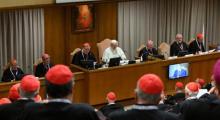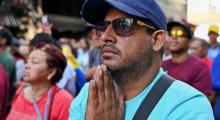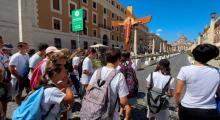Issued by the Catholic Center for Studies and Media - Jordan. Editor-in-chief Fr. Rif'at Bader - موقع أبونا abouna.org

On this small island country located in the eastern Mediterranean Sea, the relief and development agencies of Caritas can be found in five different parishes, four of the Latin Patriarchate, and one Maronite. Although each is doing different actions, all are united in their dedication to helping the vulnerable populations of the community. Today, lpj.org will present those of Nicosia and Paphos, to give an overview of their work on the island.
“And the King will answer them, ‘Truly, I say to you, as you did it to one of the least of these my brothers, you did it to me’.” (Matthew 25:40)
Such verse, said by Christ, may sum up the core mission of Caritas, founded in 1857 by Fr. Lorenz Werthmann, a German priest. Today, it is one of the largest aid and development agencies in the world. Aiming to spread the vocation of the Catholic Church, it serves vulnerable people through works of charity and justice.
In Latin, the word “Caritas” translates to “Love” and “Compassion” – hence the motto of the organization, “towards a civilization of love”. When a humanitarian crisis arises in a country, a Caritas team gets established to provide aid and assistance to those affected.
In 1986, twelve years after the Turkish invasion altered the development of the small island by tragically dividing it, Caritas Cyprus was registered as a charitable association.
In 2012, the country faced a financial crisis, followed by an influx of refugees in 2015 (the European migrant crisis), and later the COVID-19 pandemic, all which led to serious economic and political consequences on the island’s society.
“More than 10,000 individuals are currently formally registered in Caritas Nicosia's Migrant Sector alone, about 95% of whom are asylum seekers. The rest are European nationals, migrant workers, and Cypriots,” says Mrs. Gosia Chrysanthou, who has been working for Caritas Cyprus since its revival in 2012, thanks to Mgr Youssef Soueif, the Maronite Archbishop of the island, and the Latin priests.
“There would be no Caritas in Cyprus if it hadn’t been for the generosity of the Catholic Church,” she continues. “Our Nicosia team is especially grateful to the Church of the Holy Cross, as they have allowed us to use their premises in order to serve the community during these hard times," she adds. "We are also excited for the new actions taken by the Latin Church on the island: the opening of that new vicariate house will act as a backbone to all the Catholic community here. We hope this will enable us to better support the vulnerable people here."
Caritas serves a large number of the population, through their Migrant Center in Nicosia, located next to the Holy Cross church, and food banks in other cities (Larnaca, Limassol and Paphos).
“Yet whatever we provide, we know it’s not enough… We are currently unable to answer all of people’s needs,” Mrs. Gosia says.
Recently, there has been an ever-increasing wave of asylum seekers entering the country: they now make up over 5 per cent of the population.
“No to prejudice, and yes to diversity,” is the core value behind Caritas Cyprus.
“We try to provide for people’s needs, regardless of their nationality, religion, and status,” Mrs. Gosia continues. “In Nicosia, the first point of contact is our Migrant Center, where we meet the people and assess their needs. Then, our workers create a specific plan for each of them, depending on their situation.”
The Caritas team in Nicosia works on filling the gap found in the welfare system through three levels: support, connection, and integration. “First, on emergency level, we offer food and access to health care,” Mrs. Gosia says. “Then, we inform people of their rights, and we help them access them. We also offer language courses in English and Greek to help them integrate into society, as well as orientation courses. Recently, we have developed a course specifically for pregnant women and new mothers/families, for example”.
In Paphos, Caritas collects donations of food, clothes, and other house supplies. The food bank is run by volunteers, and a priest from the Institute of the Incarnate Word, Fr. Fernando Flores. They focus on providing food for those in need, specifically those who recently got out of refugee camps.
“I have been serving the Paphos community for two years, by shortlisting individuals to receive food support,” says Stanley Edji, a 36-year-old from Cameroon. “No feeling compares to the feeling you get from helping those in need.”







